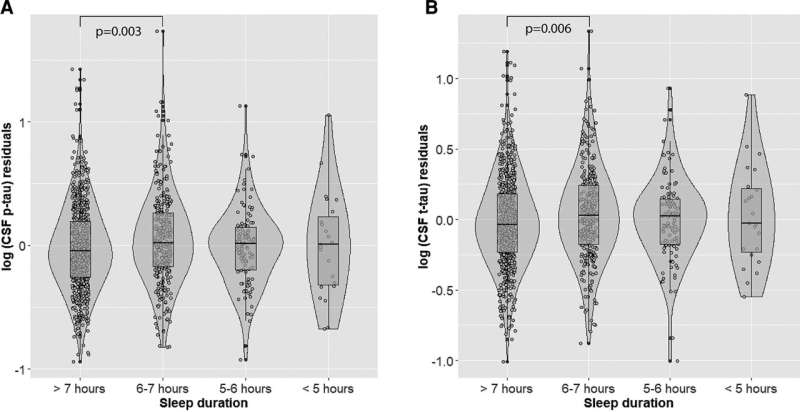
New analysis has proven an affiliation between sleep high quality—lower than seven hours—and Alzheimer’s disease-related pathology in individuals with out cognitive impairment. The research by a global workforce led by the Pasqual Maragall Foundation analysis middle, the Barcelonaβeta Brain Research Center (BBRC), along with researchers from the University of Bristol and North Bristol NHS Trust, was printed within the journal Brain Communications on Nov. 3.
The outcomes of the evaluation, a part of the European Prevention of Alzheimer’s Dementia Longitudinal Cohort Study (EPAD LCS), point out that poor sleep quality is expounded to a rise in pathology of Alzheimer’s illness. This discovering is related to assist outline future therapies, in order that they are often focused on the acceptable section of the illness.
A cross-sectional evaluation of sleep high quality
Sleep abnormalities are frequent in Alzheimer’s illness, and sleep high quality might be affected early within the preclinical stage of the illness, even when no different signs are skilled. Understanding how and when sleep deprivation contributes to Alzheimer’s illness development is vital for the design and implementation of future therapies.
Laura Stankeviciute, a predoctoral researcher on the BBRC and one of many essential authors of the research, stated, “The epidemiological and experimental data obtainable thus far already recommended that sleep abnormalities contribute to the chance of Alzheimer’s illness.
“However, earlier research had limitations because of the lack of biomarkers of Alzheimer’s illness, as a result of that they had a non-cross-sectional design, or due to the small dimension of the pattern of individuals.” This is the primary research to incorporate all of those components.
The largest cohort thus far for an evaluation of sleep high quality and effectivity
Using knowledge from the most important cohort thus far, the EPAD LCS, researchers have been in a position to validate the speculation that sleep deprivation is related to cerebrospinal fluid (CSF) biomarkers of Alzheimer’s illness cross-sectionally, and which predicts future will increase in illness in individuals with out identifiable signs of Alzheimer’s illness at baseline.
The BBRC workforce, in collaboration with researchers from the University of Bristol, analyzed knowledge from 1,168 adults over 50 years of age, together with biomarkers of Alzheimer’s illness in cerebrospinal fluid, cognitive efficiency and sleep high quality. To measure the latter, they used the Pittsburgh Sleep Quality Index (PSQI) questionnaire.
Dr. Liz Coulthard, Associate Professor in Dementia Neurology on the University of Bristol and neurologist at North Bristol NHS Trust, added, “Sleep is an untapped alternative to assist forestall Alzheimer’s and promote mind well being. Our sufferers have been fantastically dedicated to the EPAD research, finishing many checks together with lumbar punctures for analysis. Their invaluable knowledge, mixed with different websites round Europe, has now led to a greater understanding of the hyperlinks between sleep and Alzheimer’s.”
Dr. Oriol Grau, Head of the Clinical Research Group and Risk Factors for Neurodegenerative Diseases of the BBRC, defined, “Through these analyses, we now have been in a position to research associations between the primary biomarkers of Alzheimer’s illness and completely different measures of sleep high quality, similar to its complete rating, period, effectivity and alteration.”
By analyzing cerebrospinal fluid samples from 332 individuals taken at baseline and after a median interval of 1.5 years, researchers assessed the impact of baseline sleep high quality on change in biomarkers of Alzheimer’s illness over time.
Preventive practices to enhance sleep high quality
Cross-sectional analyses revealed that poor sleep high quality is considerably related to elevated t-tau protein in cerebrospinal fluid. Among different findings, it was proven {that a} brief period of sleep, lower than seven hours, is related to larger values of p-tau and t-tau, key biomarkers to measure Alzheimer’s threat within the preclinical section of the illness. Furthermore, longitudinal analyses confirmed that better sleep disturbances have been related to a lower within the Aβ42 biomarker over time.
This research demonstrates that participant-reported poor sleep high quality is related to better Alzheimer’s disease-related pathology in people with out cognitive impairment.
Laura Stankeviciute added, “Our outcomes additional strengthen the speculation that sleep disruption might signify a threat issue for Alzheimer’s illness. For this purpose, future analysis is required to check the efficacy of preventive practices, designed to enhance sleep within the presymptomatic levels of the illness, to be able to scale back the pathology of Alzheimer’s illness.”
Jonathan Blackman et al, Cross-sectional and longitudinal affiliation of sleep and Alzheimer biomarkers in cognitively unimpaired adults, Brain Communications (2022). DOI: 10.1093/braincomms/fcac257
Citation:
Association between poor sleep high quality and an elevated threat of growing Alzheimer’s (2022, November 4)
retrieved 4 November 2022
from https://medicalxpress.com/news/2022-11-association-poor-quality-alzheimer.html
This doc is topic to copyright. Apart from any honest dealing for the aim of personal research or analysis, no
half could also be reproduced with out the written permission. The content material is offered for data functions solely.













Discussion about this post